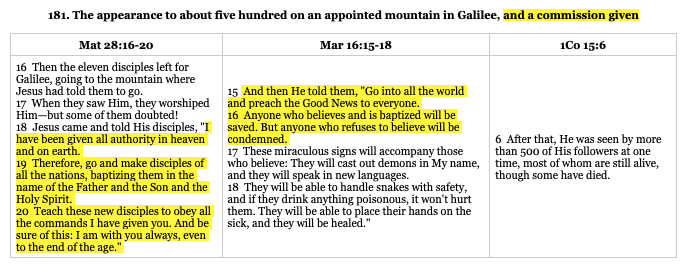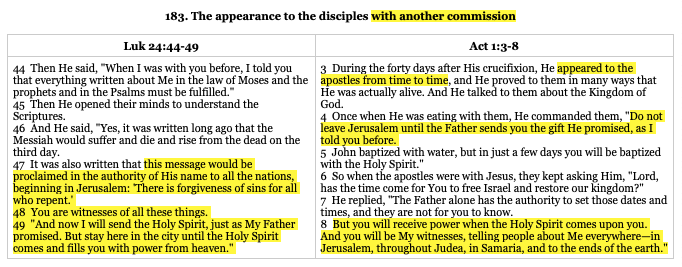I imagine pondering on this material has sparked many questions in your mind. I did not mean to infer the questions I left you with in the last Gem are the only questions you can ask. Some of you have responded with other questions that came to mind. Touché. Indeed there are. I merely asked you the questions I did to bring some initial focus to your thinking or your search. This section of the Bible is one I hold very dear. It is the reason I initially wrote this in Jakarta, Indonesia and not Matamata (Hobbiton) where I originally left.
There are those who think that the Great Commission at the end of Matthew and Mark are aberrations attached to the end of the Gospel. After-thoughts as in, “Oh and by the way guys, one more thing before I go . . .” As proof for their thinking they draw attention to the fact that Luke and John don’t include the Great Commission in their Gospels. Is that true? What conclusions did you come to after reading the portions I gave you and pondering their significance? What questions came to mind as you read through these portions? I encourage my readers to share their questions with me when the Gems are live. I may well pick up on them and investigate further if they are significant. This is a section of Scripture that I could easily turn into a series to rival the series of Gems I wrote on the Parable of the Prodigal Son. It took me 28 Gems to cover that series and even then I didn’t cover everything. I could do the same with this section, mainly because it a passion and life focus for me. But I won’t. I will restrain myself and just cover the essentials. But I will follow up on the matters that trouble you. So share them with me. What I write in these concluding Gems will be determined by your questions.
The following questions have been added to mine by you readers since the last Gem
- If the disciples were told to wait in Jerusalem how come they go to Galilee?
- If they were to begin in Jerusalem how is it they went to Galilee?
- Why did they have to begin in Jerusalem?
- Why did they have to wait in the city?
My questions repeated:
- Are there two different commissions or one?
- Why is Luke’s ending so different?
- Why does it lead Robertson to call it “another commission”?
- Is the Great Commission missing from Luke’s Gospel as some experts conclude?
- How do you reconcile the four gospels when it comes to the question of the Great Commission?
- Do they all tell the same story and emphasise the same points?
Some more questions from me:
- So which is it? “Repentance and forgiveness of sins” or “repentance for forgiveness of sins”? Does it make a difference?
- Does the phrase “In His name” belong with the “forgiveness” or with the “preaching”?
- Who are to be the witnesses and to preach? The Eleven or the wider group of disciples?
- What is the promise of the Father? When was the promise made?
For now I will address the questions of whether these are two different commissions or just one? and whether Luke has omitted the Great Commission or not?
There are enough elements present to indicate we are talking about the same things, being witnesses or sharing the message, even though the message in itself has some variation it is essentially the same. The notion of “authority” is present in each case and the Holy Spirit is present in each case. I have not included John’s elements in this comparison because his references are more scattered and not concentrated in one specific commissioning statement. I am also not going to comment further on John’s contribution as I have dealt with it when I gemmed John.
More to the point for us here, does Luke include the Great Commission in his gospel or not? The simplest and straightest answer I can give you is yes and no. Yes – to the degree to which there are allusions to the on going task, commission, authority, the same Holy Spirit and role give to the disciples as witnesses. No – in the sense that Luke does not include as a Commissioning statement like Matthew and Mark do. But he does deal with the idea of the task of spreading the Gospel, although it seems his comments are cursory at best. There an easy answer. See if you can find it by the next gem
Robertson in his harmony titles it “another commission”. But is that fair to do? He as well as you and I recognise it as being different. Are the critics right in as they claiming that the Great Commission is really a great omission in Luke and a tagged on after thought in Matthew and Mark? Is it as they claim that these Gospel writers focus on other things and then suddenly add a “by the way, I want to leave you with a task” in the last breath? The critics often use the fact that Luke doesn’t include a Great Commission to strengthen their argument for the “ after thought” idea in Matthew and Mark.
What do you think in addressing all these questions? As I have told you before, it is the depth of the questions we ask which determine the depth of our answers and ability to see things from the perspective of the original authors. So take some more time to ponder them. I WILL give you my take on it in the next Gem and not simply more questions. Now we have arrived at the time for answers.
There Is Only One Mission For The Man Who Loves God’s Word… That Is To “Live It”.
Robb Thompson
Submission to Christ without submission to the Great Commission is not submission to Christ at all. Every Christian ought to be involved in mission in some way.
Ian Vail
Here is the test to find whether your mission on earth is finished. If you’re alive, it isn’t.
Richard Bach
Don’t forget to send me YOUR questions or comments.


